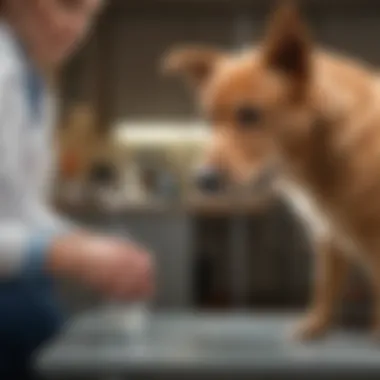Dietary Solutions for Dogs with Loose Stools


Intro
Managing a dog with loose stools can be stressful for pet owners. The discomfort and health implications for the pet are serious concerns. Understanding the potential causes and the appropriate dietary interventions can ease this challenge. This article dives deep into the factors influencing canine diarrhea, the foods that can aid in recovery, and the importance of consulting with a veterinarian when needed. Let's explore a comprehensive approach to managing this common issue with a focus on diet and health.
Understanding Your Pet
Breed Traits
Different dog breeds can have varying susceptibilities to digestive issues. For instance, smaller breeds, like the Chihuahua, may often experience loose stools due to their sensitive digestive systems. In contrast, larger breeds, such as the Labrador Retriever, can sometimes handle changes in diet better but may still face similar issues. Knowing your dog’s breed characteristics can provide insights into their health and help identify the suitability of certain dietary interventions.
Common Temperaments
A dog's temperament can impact its eating habits, making it crucial for pet owners to be observant. An anxious dog may suffer from digestive issues linked to stress, while a more curious or aggressive eater might consume unsuitable items leading to diarrhea. Understanding your pet’s behavior can guide you in identifying triggers for loose stools.
Special Needs
Some dogs have special dietary needs. Puppies, seniors, or dogs with medical conditions require specific foods that cater to their requirements. When addressing digestive issues, consider these unique needs to ensure a balanced diet.
Pet Care Essentials
Nutrition and Feeding Guidelines
Proper nutrition is vital when addressing loose stools. Here are key dietary considerations:
- Easily Digestible Foods: Rice, boiled chicken, and pumpkin can help solidify stools.
- High-Quality Protein: Dogs need proteins that are digestible, such as those from egg or fish.
- Probiotics: Incorporating probiotics can restore gut health, benefiting digestion.
Grooming Tips and Techniques
Grooming can indirectly support your dog’s health. Regular brushing and bathing keep your dog’s coat clean and can reduce skin problems that may lead to stress and consequently digestive issues.
Health and Wellness
Routine health check-ups at the vet are critical. Regular vaccinations and deworming can prevent infections leading to distress. Monitoring your pet's weight is essential as underweight or overweight dogs can experience different types of digestive disturbances.
Training and Behavior
Basic Training Techniques
Good training can alleviate anxiety and contribute to better digestion. Training your dog to sit and stay can prevent frantic eating, which may result in gastrointestinal problems.
Behavioral Problems and Solutions
Recognizing behavioral issues is vital in preventing stress-related diarrhea. Techniques such as desensitization can help anxious pets adjust to various situations without distress.
Mental Stimulation Activities
Mental stimulation can reduce stress and prevent problematic behaviors that may lead to digestive upset. Activities like puzzle toys or scent games can keep your dog engaged and calm.
Engaging with Your Pet
Interactive Games and Toys
Engagement through toys can distract your dog from stressors. Choose toys that challenge their mind and promote physical activity.
Safe Outdoor Activities
Taking walks or playing fetch in safe areas also helps to relieve stress and exercise your dog. Always ensure your dog remains within its comfort zone during outdoor activities.
Family-Friendly Pet Interactions
Encouraging healthy interactions between pets and family can foster a calm environment. Teach children how to engage safely and effectively with dogs to minimize anxiety.
Pet Adoption and Integration
Choosing the Right Pet for Your Lifestyle
If you consider adopting a dog, assess your lifestyle against the breed's needs. A high-energy breed may not suit a more sedentary family, leading to stress.


Preparing Your Home for a New Pet
Creating a safe and comfortable space for a new dog is essential. Ensure food, water, and a quiet area for rest are available.
Tips for Smooth Prologue
When introducing a new pet, do so gradually. Allow your existing pet to adjust to the newcomer to minimize stress and digestive issues.
"Managing canine diarrhea often requires a multifaceted approach, considering nutrition, behavior, and preventive care."
Understanding Loose Stools in Dogs
Understanding loose stools in dogs is essential for all pet owners. Loose stools can signify several underlying health issues. Recognizing the cause promptly can lead to effective management and recovery.
Loose stools are not merely an inconvenience; they may indicate digestive discomfort or serious health problems. When a dog experiences diarrhea, it can lead to dehydration and other complications if not addressed. Therefore, knowing how to recognize and manage this condition provides significant benefits for the dog's overall well-being.
Dog owners should consider various factors, including diet, environmental changes, and stress levels. Monitoring their pet's health can help detect issues early. This guide aims to inform about loose stools in dogs, enabling proactive measures to enhance canine health.
Defining Loose Stools
Loose stools refer to stools that are not solid. Instead, they become watery or mushy. This can result from various factors such as diet modifications or health issues. A dog with loose stools may also be straining to defecate, which can indicate a larger problem.
The definition of loose stools may vary. For some, frequent defecation may also accompany soft stools. Keeping track of these symptoms is vital for effective treatment.
Common Causes of Diarrhea
Identifying the common causes of diarrhea helps in understanding how to manage it. Pet owners must consider several factors that may trigger this condition.
Dietary Changes
Dietary changes are a leading cause of loose stools in dogs. When introducing new food or treats, a dog's digestive system may react negatively. The importance of a gradual transition cannot be underestimated. A rapid switch can upset the gut flora.
The key characteristic of dietary changes is that they can often be controlled by the pet owner. If a dog has loose stools due to diet, owners can easily adjust it. Unique features of this cause are its manageable nature and the immediate steps that can be taken to rectify the situation. The advantage here is that most dietary issues resolve quickly when corrected.
Infections and Parasites
Infections and parasites also contribute significantly to loose stools in dogs. Many different parasites, such as worms or Giardia, can invade a dog’s intestinal system. These invaders disrupt normal digestion.
A notable feature of infections and parasites is that they can have serious health implications. This makes them a crucial aspect to address promptly. The disadvantage here is that identification often requires veterinary intervention. This can lead to further stress for both dog and owner.
Food Allergies
Food allergies may also play a role in causing loose stools. An allergic reaction can manifest in many ways, including digestive issues. Certain ingredients can trigger this response.
The key characteristic of food allergies is the unpredictability of the reactions. Some dogs may react to specific proteins, while others may suffer from allergies related to grains. Identifying these allergens can be challenging. The unique feature of food allergies is that they may persist over time, requiring ongoing management. This can be a disadvantage because it necessitates careful monitoring and diet adjustments.
Stress and Anxiety
Stress and anxiety can significantly impact a dog’s digestive system. Situations such as moving homes or changing environments can disturb a dog’s routine. These emotional responses can lead to loose stools.
The key characteristic of stress and anxiety is their unpredictability. Unlike dietary changes, these emotional triggers can occur without warning. This can make it difficult for owners to identify the cause. However, understanding this aspect of loose stools can help in managing it proactively. The unique feature is that addressing the root of the stress can aid in recovery. The disadvantage, however, is that alleviating anxiety requires time and patience.
Initial Steps for Addressing Loose Stools
When a dog experiences loose stools, pet owners should act carefully and efficiently. Loose stools can lead to dehydration and other health issues if not managed properly. Taking initial steps is crucial to restore the dog's digestive health. By following a systematic approach, owners can address the immediate concern before turning to longer-term solutions.
Assessing the Severity
The first step in addressing loose stools is to assess the severity of the situation. Not all instances of diarrhea are the same, and understanding the condition can guide the right response.
- Duration: Consider how long the loose stools have persisted. If it lasts more than 24 hours, it is important to take further action.
- Frequency: Observe how often the dog is having bowel movements. Frequent episodes might indicate a more serious issue.
- Accompanying Symptoms: Look for other symptoms such as vomiting, lethargy, or changes in appetite. These signs can be indicative of underlying problems that require prompt evaluation.
- Age and Health Status: A young puppy or an elderly dog may need immediate attention due to their more vulnerable health conditions.
By assessing these factors, pet owners can determine whether to manage the issue at home or seek veterinary advice.
Temporary Fasting Protocol
Once the severity is assessed, a temporary fasting protocol can be initiated. This approach helps the dog’s digestive system to rest and recover.
- Duration of Fast: Generally, a fast of 12 to 24 hours is recommended. For puppies or very small dogs, fasting should be shorter, around 6 to 12 hours.
- Monitoring: During the fasting period, closely monitor the dog's behavior. Ensure they remain hydrated with access to fresh water.
- Post-Fast Reintroduction of Food: After the fasting period, introduce bland foods gradually. Starting with small amounts of boiled chicken and rice can help to transition the dog back to regular diet safely.


Fasting allows the gastrointestinal tract to recover and can help identify if the problem persists after food is reintroduced.
Implementing these steps with care can provide a solid foundation for dogs recovering from loose stools.
Dietary Recommendations for Recovery
Dietary recommendations play a crucial role in the recovery process for dogs experiencing loose stools. The right dietary choices can help restore balance in a dog’s digestive system, promote healing, and improve overall gut health. It is important for dog owners to understand what foods are soothing and beneficial during this period, as well as the significance of hydration and balanced nutrient intake. Easy to digest foods with moderate fat content are often recommended to enhance recovery.
Bland Diet Options
Boiled Chicken and Rice
Boiled chicken and rice is one of the most well-known remedies for dogs suffering from diarrhea. This combination is highly digestible and provides essential nutrients without overwhelming the digestive system. The key characteristic of this bland diet is its simplicity, which makes it appropriate during recovery. Boiled chicken offers lean protein, while rice provides carbohydrates that can help bind stool.
The unique feature of boiled chicken and rice is its low-fat content. High-fat foods can aggravate loose stools, while this dish ensures dogs receive nourishment without added stresses on their digestion. However, it is crucial to prepare the chicken without skin or spices to maintain its health benefits.
Pumpkin Puree
Pumpkin puree is another excellent addition to a dog’s diet during recovery from loose stools. It is high in fiber, which helps to firm up stool consistency. The high fiber content also promotes healthy gut function. Pumpkin puree can aid in absorbing excess water in the digestive tract, helping to counteract diarrhea effectively.
The key aspect that makes pumpkin puree advantageous is its nutrient density. It contains vitamins A, C, and E, as well as potassium and iron. However, it is important to use plain pumpkin puree without added sugars or spices. Some dogs may find it unpalatable, so mixing it with chicken or rice might enhance its acceptability.
Plain Yogurt
Plain yogurt is often used for its probiotic content, which can be beneficial in restoring healthy gut flora after episodes of diarrhea. These live cultures can aid in digestion and improve the overall health of the gastrointestinal tract. The key characteristic of plain yogurt is its richness in beneficial bacteria, which supports the gut health of dogs.
One unique feature of yogurt is its lactose content. While some dogs may tolerate lactose well, others may not. This can sometimes lead to further digestive upset. Therefore, it is important to introduce yogurt gradually and observe any reactions in the dog’s system. Consideration and caution are advised when incorporating yogurt into a dog’s bland diet.
Hydration Considerations
Importance of Water Intake
Adequate hydration is paramount for dogs suffering from loose stools. Diarrhea can lead to significant fluid loss, which can result in dehydration if not promptly addressed. The importance of water intake cannot be understated, as it helps maintain normal physiological functions and supports recovery.
It is beneficial to ensure that dogs have constant access to fresh, clean water. Encouraging water drinking can be made easier by offering ice cubes or adding water or broth to their food. This not only helps replace lost fluids but can also stimulate the appetite.
Electrolyte Solutions
Electrolyte solutions may be considered in more severe cases of dehydration. These solutions can help replenish essential minerals and balance fluids in the body. They are designed to replace lost electrolytes and are often used in veterinary settings for dogs with significant diarrhea.
When selecting an electrolyte solution for dogs, it is crucial to choose formulas specifically designed for pets. Human electrolyte drinks may contain ingredients that are harmful to dogs. Monitoring the dog's response to these solutions is necessary to ensure they are effective and well-tolerated.
In summary, addressing dietary needs and hydration effectively is essential for helping dogs recover from loose stools. Owners should consider bland diets like boiled chicken and rice, as well as hydration strategies to support their pet’s health.
Natural Remedies for Loose Stools
Natural remedies for loose stools in dogs can be a satisfactory approach for pet owners seeking gentler options. These remedies often aim to restore balance in the digestive system and are vital in providing supportive care. Understanding what natural remedies to implement can help alleviate symptoms effectively without leaning solely on pharmaceuticals, which might not be ideal for all pets. Moreover, such remedies can target both bacteria in the gut and overall digestive health.
Probiotics
Probiotics are beneficial bacteria that promote a healthy gut flora. Using probiotics for dogs with loose stools can reintroduce good bacteria to the intestinal tract. This is crucial since diarrhea may disrupt the natural microbial balance. There are various probiotic supplements available as powders or in forms that mix easily with food.
Important: Always consult with a veterinarian before starting probiotics, as proper dosing and specific strains matter significantly.
Herbal Supplements
Slippery Elm
Slippery elm is noted for its soothing properties. It works by forming a gel-like barrier that coats the digestive tract, reducing irritation and inflammation. Its high content of mucilage makes it a beneficial choice for dogs experiencing digestive upset. Besides, slippery elm is readily available in different forms, such as powder or capsules, enabling easy incorporation into a dog's diet.
The unique feature of slippery elm is its ability to ease discomfort while simultaneously promoting a healthy digestive environment. However, dosage should be monitored to avoid potential side effects, including changes in bowel habits or stomach upset if misused.
Chamomile
Chamomile is another herbal staple capable of soothing the digestive system. Often consumed as tea by humans, its properties translate well for dogs. Chamomile can help manage stress-related stomach issues and reduce inflammation. The key characteristic of chamomile is its mild sedative nature, which brings calmness alongside digestive aid. This makes it a great addition for dogs that experience stress, potentially contributing to loose stools.
Its unique feature lies in being both a calming agent and a digestive support. On the downside, chamomile might cause an allergic reaction in some dogs, particularly those sensitive to plants in the Asteraceae family. Therefore, it is essential to introduce chamomile carefully and consult veterinary guidance before use.


Commercial Dog Foods and Loose Stools
When addressing the issue of loose stools in dogs, understanding the role of commercial dog foods is vital. These foods are often the primary source of nutrition for many pet owners, and the formulas they choose can greatly influence their dog’s digestive health. Certain dog foods are specifically designed to support canine gut health, which makes them important options for dogs suffering from diarrhea.
Selecting the right commercial food can help restore balance in a dog's digestive system. Many brands offer specialized digestive health formulas which include ingredients that promote healthy digestion and reduce the incidence of gastrointestinal upset. It is essential to recognize that not all commercial foods are created equal. The ingredient quality, nutritional balance, and specific additives play a significant role in fostering a healthy gut flora in dogs.
Before making a transition to a new dog food, it is important to consider how it may affect your dog’s gastrointestinal tract in both the short and long term. Gradual changes generally minimize stress on the digestive system and help in the adjustment process.
Choosing Digestive Health Formulas
When selecting a dog food aimed at improving digestive health, it is crucial to look for specialized formulas. These often contain prebiotics and probiotics, which are instrumental in maintaining a healthy gut environment. Prebiotics serve as food for beneficial bacteria, while probiotics introduce live beneficial bacteria that support intestinal health.
Moreover, look for commercial foods that have a lower fat content and easily digestible protein sources like chicken or fish. Ingredients such as brown rice and sweet potatoes provide fiber which can help firm up stools. A few brands tout digestive health formulas, leading to an overall improvement in dog bowel regularity.
Identifying Ingredients to Avoid
While selecting commercial dog foods, it’s equally important to know what ingredients to avoid to prevent further gastrointestinal distress.
Artificial Additives
Artificial additives are often used to enhance flavor or prolong shelf life, but they can disrupt a dog’s digestive health. Common additives include artificial colors, preservatives, and flavorings that serve no nutritional purpose. Many dogs' digestive systems are sensitive, and these substances can lead to increased episodes of diarrhea or potentially worsen pre-existing gastrointestinal problems. Therefore, avoiding foods loaded with these ingredients in favor of all-natural options can be more beneficial.
High-Fat Content
High-fat content in dog food can also contribute to loose stools. Foods with excessive fat levels often lead to gastrointestinal upset. Fatty meals might be palatable, but they can complicate digestion for dogs, especially if their systems are already compromised. Look for forms with balanced fat levels to ensure your dog’s digestive health is not adversely impacted. The key characteristic of such foods is to provide nutrients that are easy to assimilate, thus helping to mitigate digestive troubles.
In summary, choosing the right commercial dog food is critical in managing loose stools. Focus on quality ingredients and specialized formulas that support digestive health.
Maintaining attention to both what to include and what to avoid in dog food can help in achieving stability in your dog’s digestive system and overall health.
When to Consult a Veterinarian
Recognizing when to seek professional help for a dog experiencing loose stools is vital for maintaining their health. While some digestive issues can be resolved with diet adjustments or natural remedies, certain signs indicate a more serious underlying problem. Understanding these signs enables pet owners to make informed decisions and ensures their dog receives the necessary care.
Signs Indicating Veterinary Care
Prolonged Diarrhea
Prolonged diarrhea is defined as any instance of loose stools lasting more than 24 hours. This symptom can lead to dehydration and nutrient loss, which may become severe if untreated. The key characteristic of prolonged diarrhea is its duration. Unlike occasional laxative effect, lasting diarrhea can signal a significant issue, including infections or underlying health problems. It is crucial for pet owners to monitor their dog's bowel habits closely.
Advantages of recognizing prolonged diarrhea early include preventing serious complications. Rapid intervention can often lead to quicker recovery, minimizing discomfort for the dog. This symptom is a sign for pet owners to consult their veterinarian without delay.
Blood in Stool
Blood in feces is alarming and often represents a serious concern. This symptom may indicate damage to the intestinal lining or severe infections such as parvovirus. The key feature of blood in stool is its visibility, which varies from bright red streaks to dark, tarry stools. Both types suggest different issues requiring immediate veterinary attention.
This symptom highlights the necessity of timely veterinary intervention. Early diagnosis and treatment can be the difference between recovery and serious health issues. Therefore, detecting blood in a dog's stool necessitates prompt consultation with a vet to identify and address the underlying problem.
Dehydration Symptoms
Dehydration is a potentially severe outcome if diarrhea is not managed effectively. Symptoms of dehydration include dry gums, excessive panting, and lethargy. These signs are crucial as they reflect the body's inability to maintain necessary fluid levels.
Recognizing dehydration symptoms early allows pet owners to act swiftly. Rehydration solutions or veterinary care may be needed, depending on the severity. Addressing dehydration not only improves the dog’s comfort but also promotes overall health and well-being.
Diagnostic Tests May Be Necessary
Diagnostic tests may be essential in cases where symptoms persist. These tests help determine the underlying cause of the diarrhea and assist in formulating a proper treatment plan. Various tests may include fecal examinations, blood tests, or imaging studies. These evaluations are vital as they provide insight into the dog's health status, allowing for targeted interventions and monitoring recovery.
Long-Term Management Strategies
Managing loose stools in dogs requires a multifaceted approach. Long-term strategies not only address the immediate concerns but also foster an environment for improved digestive health. Pet owners must consider consistency in feeding, quality of food, and the individual dog's needs. This holistic view enhances the overall well-being and may significantly reduce incidents of gastrointestinal upset.
Establishing a Consistent Feeding Routine
A well-structured feeding routine plays a key role in maintaining digestive health for dogs. A consistent schedule helps regulate their digestive system, allowing their bodies to anticipate feeding times. Here are several considerations to keep in mind while establishing this routine:
- Fixed Meal Times: Dogs should be fed at the same times every day. This consistency aids digestion and reduces anxiety around feeding.
- Portion Control: Adjusting the amount of food based on the dog's size, age, and activity level is crucial. Irregular portion sizes can lead to overeating or under-nutrition, which can worsen digestive issues.
- Tracking Dietary Changes: If introducing new food, do so gradually over a week. This allows the dog's digestive system to adapt without sudden disruptions.
- Limit Snacks and Treats: Providing a few healthy treats can be rewarding, but excessive snacking can interfere with the scheduled meals.
Establishing a consistent feeding schedule not only regulates digestion but can also help track any adverse reactions to new foods.
Understanding Food Sensitivities
Each dog is unique, with specific dietary needs or sensitivities. Identifying these sensitivities is essential in managing loose stools effectively. Consider the following aspects when evaluating your dog's food preferences:
- Allergy Testing: If your dog frequently experiences diarrhea, consult a veterinarian to test for food allergies. Common allergens include beef, dairy, and wheat.
- Ingredient Awareness: Monitor the ingredients in dog food. Often, brands that focus on premium ingredients without artificial additives are preferable. High-quality protein sources are important to consider.
- Response Observation: Make detailed notes when introducing new foods. Observing changes in stool consistency, behavior, or skin condition can show how your dog responds to specific ingredients.
- Novel Protein Sources: If sensitivities are suspected, it might be worth trying dog foods that include novel proteins like duck or venison, which can be easier for some sensitive dogs to digest.



